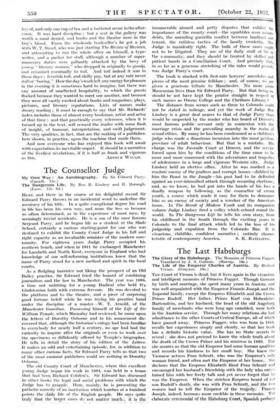The Counsellor Judge
My Own Way : An Autobiography. By Sir Edward Parry. (Cassell. 15s.) The Dangerous Life. By Ben B. Lindsey and R. Borough. (Lane. 12s. 6d.) HERE and there in the course of his delightful record Sir Edward Parry throws in an incidental word to underline the accuracy of his title. In a quite exceptional degree his road in life has been his own way, and none the less so because so often determined, as in the experience of most men, by seemingly trivial accidents. He is a son of the once famous Serjeant Parry, and he began life as a student at the Slade School, certainly a curious starting-point for one who was destined to exhibit the County Court Judge in his full and right capacity as an invaluable minister of the modern com- munity. For eighteen years Judge Parry occupied his northern bench, and when in 1911 he exchanged Manchester for Lambeth and North Kent, everyone in England who had knowledge of our self-reforming institutions knew that the name of Parry stood for a new method and spirit in the local
courts.
As a fledgling barrister not liking the prospect of an Old
Bailey practice, Sir Edward tried the hazard of combining journalism and the law in Manchester. The year was 1886, a time not unfitting for a young Radical who held the Gladstonian faith with extreme fervour. He was devoted to the platform and to the theatre, and a piece of surprising good fortune befell while he was trying his prentice hand under the discipline of a master—W. T. Arnold, of the Manchester Guardian. Possessing himself of the Life of Sir William Temple, which Macaulay had reviewed, he came upon the letters of Dorothy Osborne and to his amazement dis- covered that, although the historian's eulogy had been familiar to everybody for nearly half a century, no ope had had the curiosity to inquire after the originals or even to work over the specimens so diffidently offered by Temple's biographer. He tells in detail the story of his edition of the Letters. It makes an odd and entertaining episode, for, in addition to many other curious facts, Sir Edward Parry tells us that two of the most eminent publishers could see nothing in Dorothy Osborne.
The old County Court of Manchester, where this excellent young Judge began his work in 1894, was held in a house that had been Richard Cobden's. Sir Edward has discussed in other books the legal and social problems with which the Judge has to grapple. Here, mainly, he is presenting the pathetic comedy of an institution which touches at a hundred points the daily life of the English people. He says quite
truly that the larger 'cases do not matter Much ; it is the innumerable absurd and petty disputes that exhibit the importance of the county-court—the squabbles over minute debts, the unending guerrilla conflict between landlord and tenant, the ruthless tactics of the family vendetta. The Judge is manifestly right. The bulk of these eases ought not to be litigited. They are o- f the daily stuff of life in the cammtmity, and they should be treated by skilled and patient hands in a Conciliation Court. And precisely that, in so far as a generous stretching of the rules would permit,' was Judge Parry's court.
The book is stocked with first-rate lawyers' anecdotes and pieces of the most genuine folklore ; and, of course, we are given a generous tribute to Manchester. No more pious Mancunian lives than Sir Edward Parry. But that being so, should he not have kept the printer straight in respect of such names as Owens College and the Chetham Library ?
The distance from scenes such as these to Colorado could not be stated in mileage, and yet the work of Judge Ben Lindsey is a great deal nearer to that of Judge Parry than would be suspected by the reader who has heard of Denver's most famous public servant only in connexion with the marriage crisis and the prevailing anarchy in the realm of sexual ethics. By many he has been condemned as a children's judge who made a disastrous incursion into the most perilous province of adult behaviour. But that is a mistake. His charge was the Juvenile Court at Denver, and the service forced upon him by the conditions of the time came to be more and more concerned with the adventures and tragedies of adolescence in a large and vigorous Western city. Judge Lindsey held an elective office. After he was marked as a resolute enemy of the grafters and corrupt bosses—dubbed by him the Beast in the Jungle—his post had to be defended against an ever-intensified attack through recurring elections and, as we know, he had put into the hands of his foes a deadly weapon by following, as the counsellor of errant youth, a course which made it easy for them to denounce him as an enemy of society and a wrecker of the American home. In The Revolt of Modern Youth and its companion volume Judge Lindsey fired a volley which echoed round the world. In The Dangerous Life he tells his own story, from his childhood in the South through the exciting years in Colorado to the final attack which led to the loss of his judgeship and expulsion from the Colorado Bar. It is vivacious, childlike, confident narrative ; entirely charac- teristic of contemporary America. S. K. RATCLIFFE.














































 Previous page
Previous page